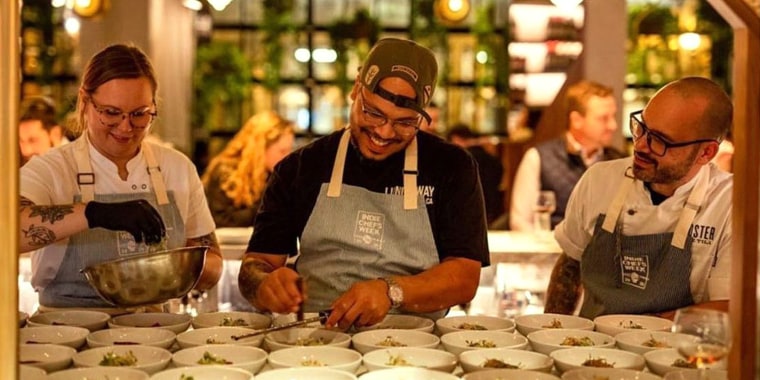So much of what makes up American cuisine can be understood through our country's complicated history. Chefs Jerome Grant and Ashleigh Shanti know this history keenly as culinary experts on the influence of Black cooks on American food.
"Brown hands, minority hands were always behind the scenes of American hospitality and really helped grow what American hospitality is," said Grant, the owner of Jackie in Washington, D.C., and the previous executive chef at the National Museum of the American Indian and the National Museum of African American History and Culture. "Whether we were slaves, indentured servants, feeding the cowboys or looking for new beginnings."
Shanti, a chef in Asheville, North Carolina, who focuses on Appalachian culture and cuisine, said preserving that history is simply tradition in many Black families like her own.
"I don't have many written recipes of my family's, but I can call my aunt and she'll orate this amazing barbecue hash that she's been making for years," Shanti said.
This interview has been lightly edited for length and clarity.
What impact has the Black community had on American Food?
Ashleigh Shanti: I have always thought to myself that Black people have always been chefs and cooks. I am thankful to live in a time now where that's actually recognized and you're seeing more Black head chefs and Black restaurants. Because in some of those first historic images that we know of, Black people in kitchens have been in roles of servitude. And I love to see that finally changing.
Jerome Grant: To really understand people, the best way to do it is through food, to understand their stories, a piece of their heritage, who they are and where they came from. Brown hands, minority hands were always behind the scenes of American hospitality and really helped grow what American hospitality is. Whether we were slaves, indentured servants, feeding the cowboys or looking for new beginnings.
Where can we trace back the roots of some of these dishes and ingredients?
Shanti: I think it's important to highlight that the origin of a lot of these foods that we've cooked for years, not just from the South, but all over America, they did originate from West Africa, from enslaved Africans. Beans, rice, okra, a lot of these seeds made their way from West Africa to the South.
Grant: Ingredients such as sweet potatoes and benne seeds, many of these were brought over during the trans-Atlantic slave [trade]. They were grown through places like Charleston, where they still run rampant today. Collard greens, all those types of things that, at one point, people deemed them as trash, it was like, "no, this is a part of our heritage."
Why has the Black community been so successful in passing down recipes each generation?
Shanti: I largely cook food that expresses my heritage and just stories of my past. And I try and tell stories relating to the matriarchs in my family. I think because the oral history of African Americans is so powerful. And I think that's how we express ourselves and that is how we pass down traditions and recipes. I don't have many written recipes of my family's, but I can call my aunt and she'll orate this amazing barbecue hash that she's been making for years.
Where do you see the future of food going in the Black community?
Grant: The sky's the limit. Just have a meal, have a meal with somebody. You get to understand so much more about them. It is such an intimate thing. And with Black food, it's extremely important to showcase where it was all this time in history and what it contributed to history. It's done so many great things to what America is now that it shouldn't be overshadowed.
Shanti: We're used to our moms in the kitchen cooking and in our homes. I think women take on a very large role in the kitchen. The way that the industry is formatted and the way that it's set up, it does make it difficult for women to have a desire to be in those environments. It's framed to often keep women and people of color and people that are marginalized away from it. And I think that that's part of what I want to change about the food industry. I think that the future looks like not just staffing with people of color, but actually building communities of color and pouring back into those communities since so much has been taken from us, whether that be ideas or sweat labor or sweat equity. I think that the ask is, "What is being put back into our communities?"



